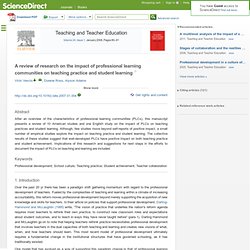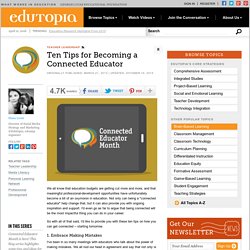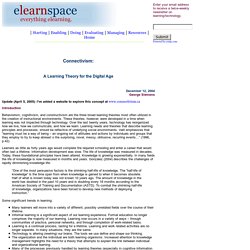

The 7 Values That Drive IDEO. A review of research on the impact of professional learning communities on teaching practice and student learning. Abstract After an overview of the characteristics of professional learning communities (PLCs), this manuscript presents a review of 10 American studies and one English study on the impact of PLCs on teaching practices and student learning.

Although, few studies move beyond self-reports of positive impact, a small number of empirical studies explore the impact on teaching practice and student learning. The collective results of these studies suggest that well-developed PLCs have positive impact on both teaching practice and student achievement. Implications of this research and suggestions for next steps in the efforts to document the impact of PLCs on teaching and learning are included. Keywords Professional development; School culture; Teaching practice; Student achievement; Teacher collaboration 1. Over the past 20 yr there has been a paradigm shift gathering momentum with regard to the professional development of teachers. 2. 3. The studies for our review come from two key sources. What teachers need and reformers ignore: time to collaborate. Connectivism.
Www.ideapartnership.org/documents/CoP-Collection/CoP-Guidebook.pdf.
Cultivating Connections. Planning. Shifts in PD-Examples. Intro-to-CoPs. Www.ktdrr.org/ktlibrary/articles_pubs/ncddrwork/focus/focus11/Focus11.pdf. Technology for CoP. Cultivating Knowledge. Redirect Notice. Value and Evaluation. Www.iste.org/docs/pdfs/nets-c.pdf?sfvrsn=2. Ten Tips for Becoming a Connected Educator. We all know that education budgets are getting cut more and more, and that meaningful professional-development opportunities have unfortunately become a bit of an oxymoron in education.

Not only can being a "connected educator" help change that, but it can also provide you with ongoing inspiration and support. I'd even go as far to argue that being connected will be the most impactful thing you can do in your career. So with all of that said, I'd like to provide you with these ten tips on how you can get connected -- starting tomorrow. 1. Embrace Making Mistakes I've been in so many meetings with educators who talk about the power of making mistakes. 2. When I teach others how to get started using social media for professional development, many request a manual of some sort -- a detailed step-by-step account that tells you exactly what you need to do. 3.
I recently heard this playful metaphor of a puppy getting loose for the first time to describe how people should use social media. Connectivism: A Learning Theory for the Digital Age. Connectivism: A Learning Theory for the Digital Age December 12, 2004 George Siemens Update (April 5, 2005): I've added a website to explore this concept at www.connectivism.ca Introduction Behaviorism, cognitivism, and constructivism are the three broad learning theories most often utilized in the creation of instructional environments.

Learners as little as forty years ago would complete the required schooling and enter a career that would often last a lifetime. “One of the most persuasive factors is the shrinking half-life of knowledge. Some significant trends in learning: 3-prongedchart2.jpg (1409×1050) How Technology Is Changing The Way Organizations Learn.